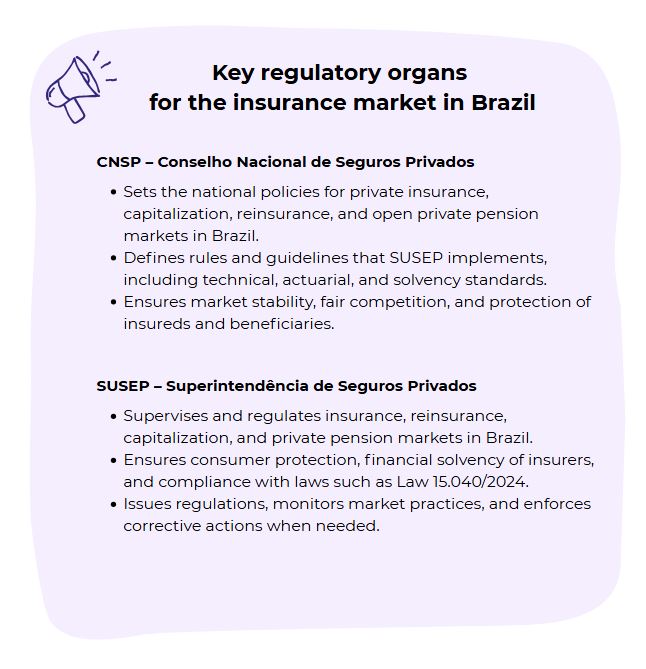Since 2024, Brazil has had a new general insurance law. The law consolidates several legal provisions and existing market practices. All lines of insurance are subject to the law (except health insurance). In fact, the law lacks clarity on several issues, which is expected to lead to various conflicts that will need to be clarified by SUSEP – Superintendência de Seguros Privados is the regulatory body for insurance in Brazil – or even judicially. In this context, we would like to highlight a few specific points:
“Non-Admitted”
The requirement to contract insurance for risks in Brazil with a licensed insurer in Brazilian territory remains in effect. Brazil continues to be “Non-Admitted” – as established under Law 73/1966 (Art. 24 and 26); Civil Code (Art. 757) and CNSP Nr. 451, 19.12.22 (Section II).
Exceptions apply to risks for which the local insurance market does not provide coverage. This must be demonstrated by submitting the risk to a certain number of Brazilian insurers that usually write the line of business. Exceptions also apply to risks governed by international agreements, such as very large infrastructure projects or nuclear risks.
It is worth noting that DIC (Difference in Conditions) and DIL (Difference in Limits) coverage are not excluded from this prohibition.
Policy Language
Only policies written in Portuguese are considered valid (15.040/2024 Art 48, §2). Even individual clauses in a foreign language – such as a sanctions clause – are null and void. Consequently, Brazilian insurers will continue not to issue official English versions of policy wordings.
Contractual Freedom
The law does not restrict the insurer’s freedom to draft its own policy wordings (Law 15.040/2024 Art 48; §3). At the same time, it suggests the existence of standardized wordings to be filed with the regulatory body.
This is one of the aspects that still needs to be better clarified, – particularly in the context of global programs where the ability to issue the local policy closely following the wording of the master policy can be highly relevant.
Interpretation of the Policy Contract
The law establishes that exclusions and limitations of coverage must be clear and highlighted, otherwise they will be considered null (Law 15.040/2024; Art 57). In fact, this concept has already been applied by courts in disputes with insurers. The law also states that, in case of doubt, the interpretation must favor the insured.
Premium Payment
The requirement that the premium must be collected directly by the insurer from the insured through the banking system remains in effect (Law 15.040/2024 Art 41 to 44). Brokers are not authorized to collect premiums.
As a matter of fact, the premium has to be collected directly by the insurer using specific financial structures defined by SUSEP within the Brazilian bank system. The payment cannot be made directly to the insurance company via bank transfer, whether from within Brazil or from abroad (even though Brazil is part of the SWIFT system).
For personal lines, the use of credit cards for premium payment is accepted by some insurers. However, this does not apply to commercial risks.
In the event of non-payment, the insurer will only be exempt from coverage after notifying the insured. This understanding has already been applied by the courts.
Settlements and Agreements
The law allows the insurer to enter into settlements with third-party claimants without this implying recognition of liability by the insured (Law 15.040/2024 Art 106). This represents a change from the previous legislation, which prohibited settlements without the insurer’s consent.
General Statute of Limitations
The general period for the insured to file a claim against the insurer remains one year. However, the law changes the starting point for this period, which now begins on the date of knowledge of the insurer’s express and reasoned denial (Law 15.040/2024 Art 126). This differs from the Civil Code, which refers to the triggering event as the start of the limitation period. This point raises questions and will also need clearer definitions.
The new law maintains the absence of a maximum deadline for notifying a claim. It uses the term “promptly” instead of “as soon as one becomes aware” from the Civil Code. This change is crucial for statute of limitations purposes, as the law shifts the limitation trigger to the date of the insurer’s denial. Delayed communication may result in claims not being time-barred.
Disclosure of Liability Insurance
One of the major new provisions is that the insured must inform affected third parties about the existence and content of the insurance policy (Law 15.040/2024 Art 86).
In the case of multiple affected parties, the insurer is released super by making full indemnity payments to one or more of them, provided it is unaware of the others.
Key Takeaways:
- The main objective of Law 15.040/2024 is to consolidate and modernize Brazil’s insurance framework by unifying rules, reinforcing consumer protection, and clarifying market practices across all lines of insurance (except health).
- However, various aspects remain unclear and have not been adequately or completely addressed and will require further regulation or judicial interpretation in the future.
- The Law was primarily designed to address small policies like private motor insurance. The specific needs of large risks have not been adequately considered.


Disclaimer: This article is for general information purposes only and does not constitute legal advice. Although the content has been compiled with the utmost care, no guarantee can be given for its accuracy, completeness, or timeliness. Individual advice—particularly taking into account the specific circumstances of each case—remains essential.
